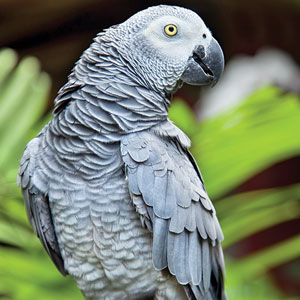
African Grey Parrots
African Greys are among the most popular pet birds – and with good reason! These beautiful, charismatic babies can be incredible, lifelong friends. Learning the breed's unique characteristics helps us respect these amazing animals and could help you decide if an African Grey is right for your family. With diligent care and affection, you could become a great parront for a fun-loving fid.
Fast Facts
Lifespan: 25 to 50 years or more, depending upon quality of careSize: 11 to 14 inches
Native to West and Central Africa
Endangered Status: Vulnerable
Diet
In the wild, Greys enjoy leaves, seeds, palm roots, leafy vegetables, and occasionally, even insects. In captivity, they do best with a diet of enriched seeds pellets, fruits, and vegetables topped off with cuttlebone for extra calcium. Treats can help you train your birdie buddy, but, as with little kids, you can't always let them set the menu! Greys are sensitive to caloric imbalances and can become very ill if they eat too many fatty and salty foods. A mixture between nutritious staples and occasional fun snacks is best. Check out Tips for Feeding Your Bird for more info on which foods are an A+ for avian friends.Perks
African Greys are gentle, social birds who eagerly engage with people. They learn fast, so you can teach them a wide variety of tricks. Most of all, African Greys are famous for their talents with speech. While some merely mimic human speech and household sounds, others develop complex vocabularies. The most intelligent may even be able to count, correctly identify objects, and communicate their desires! PS: Keep this talent for language in mind if you have an African Grey or are considering adding one to your family. These feathers can absorb words after hearing them just a couple times, so be careful what you say around your smarty pants parrot!Challenges
Even if the entire family loves your feather baby, Greys may become "one person birds". Often resulting from too much physical attention, the Grey develops a one-sided "crush" on a single person. While this may sound cute, for birds, this bond represents a reproductive relationship. The jealous behavior their unrequited love inspires can become dangerous for other humans and unhealthy for the Grey. Learn more about one person birds here.Caring for these intelligent, friendly birds is a big responsibility. First of all, they require hours of intellectually stimulating play, training, and attention every day. Extended time alone makes these social, smart babies miserable, resulting in feather picking, self-mutilation, and shrieking. Additionally, you must consider the decades-long commitment Greys require. Think about the cost of fresh fruits and veggies, high quality seed and pellets, new toys, and trips to the avian veterinarian. Are you ready to invest in a pet for 20 to 50 years? Considering both your current routine and what you imagine for your future will help you determine if an African Grey is the right pet for you.
Fun Facts
- Greys are monogamous. The female sits on the eggs, and the male brings her food. Once the eggs hatch, the parents feed and care for the babies together.
- There are actually two different kinds of African Grey – the Congo African Grey and the Timneh African Grey. The Congo African Grey is the larger species, with light grey feathers all over and bright red feathers under its tail. The Timneh African Grey is smaller, with darker grey feathers and dark red under tail feathers.
- The wild population of African Greys has decreased fairly rapidly in the last quarter century as they are illegally caught for the pet trade and as their rainforest habitats are destroyed.
While Greys may be challenging pets, if you have the time, energy, and funds to properly care for one, they will reward you with years of affection, engagement, and delight. You'll never have another dull day if you adopt a Grey!
Discover More!
My First Bird: What Kind of Bird Should I Get?How to Teach a Bird to Talk
Providing Your Bird With Intellectual Stimulation
How to Prevent Boredom in Your Bird
Return to Bird Articles


